15-02-2021
Exceptional catalyst selectivity prompts cycle length extension at Petro Rabigh monoethylene glycol plant
Rabigh Refining & Petrochemical Company has achieved an impressive 92% catalyst selectivity at the start of the most recent cycle at its 600,000-t/y monoethylene glycol (MEG) production facility in Saudi Arabia. The plant uses the advanced Shell OMEGA process, which is based on the catalytic conversion of both ethylene to ethylene oxide and ethylene oxide to ethylene glycol.
Ethylene oxide catalyst selectivity is a key factor in the efficiency of MEG production: a higher selectivity means that smaller volumes of raw material are required to manufacture the product. The cycle that started in May 2020 marked a change in catalyst from Shell Catalysts & Technologies S-888 (which had achieved an initial selectivity of 90.9%) to S-889 catalyst.
The resulting improvement of just over 1% will deliver significant savings and lead to higher profitability or enhanced competitiveness in what is, at present, a very challenging market. This catalyst upgrade is expected to reduce raw materials requirements by 4,000 t/y for ethylene and 14,000 t/y for oxygen. Over a full cycle, these reductions could translate into a multimillion-dollar saving.
This outstanding performance is the result of both the improved catalyst and the way the unit is operated. The Petro Rabigh plant carried out a well-structured catalyst selection process with an emphasis on maximising performance and extending the run length. In addition, the plant has been able to sustain very stable operations thanks to the tireless efforts of the highly skilled engineers and the relentless focus on keeping the catalyst fully optimised by careful chloride level adjustments.
The plant has been using Shell Catalysts & Technologies catalysts since 2009. “We have achieved strong results across three- and four-year cycles with earlier-generation catalysts,” explains Saeed Al Ghamdi, Head of Process Engineering at Petro Rabigh. “The stability of the new catalyst, coupled with its increased selectivity, has encouraged us to look at pushing the cycle length to five years.”
Learn more about optimising refinery operations with collaboration and digitisation
Ammar Bakheet, Process Engineer, Petro Rabigh, said, “The results show that, with careful planning and well-managed start-ups and processes, engineers can achieve substantial improvements in performance by moving to the latest generation of catalyst products.”
“The continuous engagement and collaboration with Petro Rabigh were key enablers for selecting the optimum catalyst for Petro Rabigh,” observed Jaafar El-Masri, Technical Service Manager, Shell Catalysts & Technologies. “This will add substantial value in the form of raw materials savings, and I am excited at the prospect of seeing the current catalyst batch run for the full five years.”
Sponsor:
News Category:
-
Shell Catalysts & Technologies supports seamless startup at Hyundai Chemicals HPC
Using Shell Catalysts & Technologies (SC&T) C2 FE selective hydrogenation catalyst, the Heavy-Feed Petrochemical Complex (HPC) operated by Hyundai Chemicals achieved ...
09-02-2022
-
Seamless startup at PetroChina Tarim supported by Shell Catalysts & Technologies
The Tarim Ethane to Ethylene Project operated by PetroChina achieved a fast and successful startup at the end of August using Shell Catalysts & Technologies (SC&T) ...
30-11-2021
-
Cansolv CO2 capture technology improvements tested at waste to energy plant
Technip Energies and Shell Catalysts & Technologies announce that their jointly developed improvements on the Cansolv CO2 Capture technology are being tested in a ...
15-10-2021
-
Shell Catalysts & Technologies (SC&T) has successfully commercialized OparisNext, their latest generation catalyst, at Ningbo Zhongjin PetroChemical Co, Ltd. ...
26-08-2021
-
Shell Catalysts & Technologies form global avlliance with Arbios Biotech
Shell Catalysts & Technologies and Arbios Biotech, a joint venture between Licella and Canfor, have formed a new global alliance aimed at utilizing SC&T’s upgrading ...
06-05-2021
-
Shell Catalysts & Technologies to supply ethylene oxide catalyst to Jiangsu Dynamic Chemical
Shell Catalysts & Technologies will supply ethylene oxide catalyst to Jiangsu Dynamic Chemical after demonstrating high selectivity, desired reliability ...
08-04-2021
-
PT Pertamina Rosneft selects Shell Catalysts & Technologies
PT Pertamina Rosneft Pengolahan dan Petrokimia (PT PRPP) will build a grassroots refinery in Tuban, Java Timur, Indonesia, using state-of-the-art proprietary technologies ...
25-02-2021
-
Rabigh Refining & Petrochemical Company has achieved an impressive 92% catalyst selectivity at the start of the most recent cycle at its 600,000-t/y monoethylene ...
15-02-2021
-
Shangneng refinery selects MACH from Shell Catalysts & Technologies
Shandong Shangneng Group has chosen Shell Catalysts & Technologies to provide it with their April 2021 hydrocracking catalyst refill for its two-stage DAO hydrocracker ...
14-01-2021
-
Shell launches Blue Hydrogen Process
Shell Catalysts & Technologies has launched the Shell Blue Hydrogen Process to help the decarbonisation of hard-to-abate heavy industries. Unveiled today, the process ...
02-11-2020

















